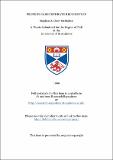Files in this item
Protein-carbohydrate recognition
Item metadata
| dc.contributor.advisor | Naismith, Jim | |
| dc.contributor.author | McMahon, Stephen Andrew | |
| dc.coverage.spatial | 275 p. | en_US |
| dc.date.accessioned | 2018-06-14T09:30:01Z | |
| dc.date.available | 2018-06-14T09:30:01Z | |
| dc.date.issued | 1999 | |
| dc.identifier.uri | https://hdl.handle.net/10023/14045 | |
| dc.description.abstract | Protein-carbohydrate recognition is an important target for inhibitor development. Improved inhibitor design requires a fundamental molecular basis of these interactions. This thesis describes the preliminary structural studies on three carbohydrate processing enzymes, UDP-galactopyranose mutase, alpha-D-glucose-1-phosphate thymidylyltransferase and TDP-glucose 4,6-dehydratase. These enzymes are found in important human pathogens such as Mycobacterium tuberculosis and Salmonella typhimurium. The major focus of the thesis has been on UDP-galactopyranose mutase, the enzyme responsible for catalysing synthesis of the thermodynamically unfavourable 5 membered ring form of galactose, UDP-galactofuranose from the thermodynamically favoured 6 membered ring form, UDP-galactopyranose. UDP-galactofuranose plays a key role in mycobacterial cell walls. This thesis also describes work with concanavalin A. This legume lectin is an invaluable model for the study of protein-carbohydrate interactions. Two concanavalin A complexes are discussed. Both structures clear up misunderstandings in the literature and provide an insight into designing enzyme inhibitors. | en_US |
| dc.language.iso | en | en_US |
| dc.publisher | University of St Andrews | |
| dc.subject.lcc | QR77.3M7 | |
| dc.subject.lcsh | Bacterial cell walls | en |
| dc.title | Protein-carbohydrate recognition | en_US |
| dc.type | Thesis | en_US |
| dc.type.qualificationlevel | Doctoral | en_US |
| dc.type.qualificationname | PhD Doctor of Philosophy | en_US |
| dc.publisher.institution | The University of St Andrews | en_US |
This item appears in the following Collection(s)
Items in the St Andrews Research Repository are protected by copyright, with all rights reserved, unless otherwise indicated.

